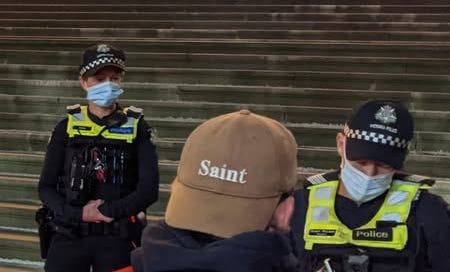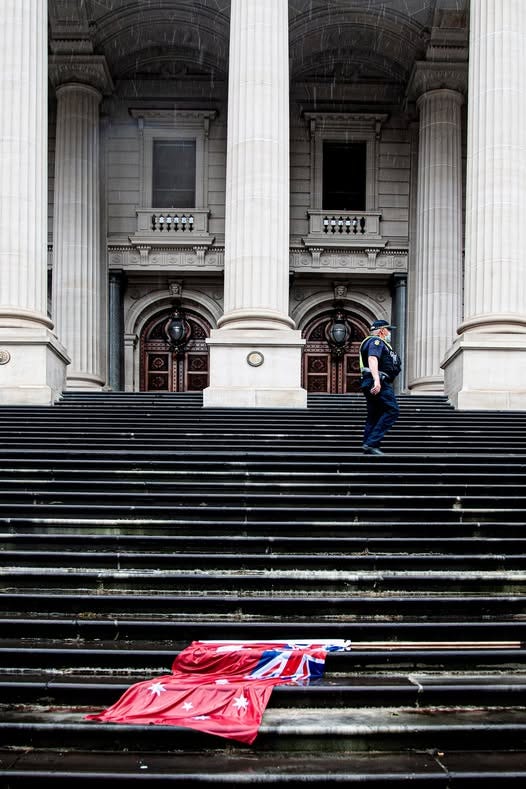Written Dec 22, 2021.
A Christmas memory we shouldn’t forget.
Three times he walked past, mask on, as if he were racing somewhere he was late for, before he stopped at the edge of the steps, where a man—who often came and sat on these steps, the steps of Parliament—asked him if he was okay.
“My whole family has turned against me,” the man said, “because I won’t take the jab. I’m an outcast, and now I’ve lost my job.” After this, because someone was listening, he wouldn’t stop talking. Then, before long, he was eating some watermelon from a fruit platter that others were handing out, as another new person took to the microphone. This was a young scientist, now also unemployed, who went on to rant, articulately, about how nothing that was happening was following the correct protocols of science.
Down here, this happened every day. Together, we were like a refugee camp—a human island of kindness—where ordinary people, desperate to momentarily escape the city’s now unforgiving and socially acceptable cruelty, washed up.
Another young woman I spoke to said she came because she felt like she was drowning at home, drowning in the grief of all that was being lost.
Markiyan came down and played some violin. One old man stood up and sang Amazing Grace, then Luke pulled out his guitar and played some protest songs, both old and new, as the week ran away with itself until Abby, our gracious leader, realized it was Thursday.
Today, a lot of the talk was about the talkback radio interviews where a government minister had spoken about how the dole was going to be cut for the unvaccinated. There was nothing in the press—just these interviews.
Was it real, or was the government testing the waters to gauge public reaction?
Several people admitted to me, with taut desperation in their eyes, how they were now contemplating suicide. Later, I wondered, as I sat there listening to the speeches, how many other people out there—people in the suburbs—had heard that interview but were unaware of us, or couldn’t reach us, and had instead chosen to leave.
Damien called me and said this government minister had apparently claimed to be a Christian, which again left you shaking your head as you wondered where all the teachings of Jesus—and what I took for granted was our country’s abundant and natural empathy—had gone.
Once again, no spiritual leaders from any religion came down to offer support, even if it was just a willingness to listen to these people, to sit with them.
Were they also scared of guilt by association?
No, all these people had, as they sat on the cold steps, was each other and their personal integrity. All they had was freedom, but the cost of this freedom was growing every day, as this tide of tyranny rolled in ever higher, hungry to break them. To turn them into slaves.
For that’s what these radio interviews were. They were the system stating clearly that it was fully prepared to raise the stakes until these defiant ones were left with two choices: comply or die.
This was a declaration of war. A silent war without bombs. A war whose goal was to destroy the people’s independence. A war that wanted their souls.
Around the world, the same war was being fought—mass protests in Italy, France, and Israel too—but here, in this city, there was only this island of partisans offering momentary solace as the majority, who had already knowingly or unknowingly succumbed, walked or drove past.
The majority that would probably still continue to silently pass, even as, once this bill to make the emergency powers permanent was passed, the authorities would arrive and take us all away to the camps.
And yet, to deal with this unfathomable yet clear and approaching possibility, we joked about it. Who would get which bunk, and would the camps be unisex?
But jokes aside, I was quieter today because of Jaye. This young woman had stated on our show that she believed we had a moral responsibility, despite how dire the situation, not to sell hopelessness.
Now, not only did I admire this, but I agreed with it. But when you also believed that lying was pointless—and since our numbers were so few—how was it possible to live up to this? And here on the steps, the only answer I could find lay in the hands of a homeless man.
Whomever he was, he was clearly insane but harmless, and he’d been dancing around us all day, talking mostly in his own language. But at one point, as I sat there feeling lost on the approaching edge of democracy, I noticed he was eating a slice of pizza. Someone here had offered him a slice from the boxes being handed around, and calmer, he stood there eating it.
It was a small act of kindness amidst a small group of kind people, who were surrounded by a city that, thanks to fear, no longer seemed to find any point or value in this.
Today, Friday, we will be here again. So, if you are stuck in this colder Melbourne and need some momentary refuge, all are welcome—vaxxed and unvaxxed. So why not come down and breathe?
Michael Gray Griffith






Yes, I also took part in an anti-lockdown protest here in Glasgow. We were a ragged army of dissidents, of all backgrounds, and we defiantly marched through the city streets with our message of hope and solidarity. We plastered the BBC Scotland office with stickers. Obviously, we got no media attention. But we expected none. We were thousands, but we were invisible - the ultimate awkward squad. Lest we forget - at least we stood up.
Never forget